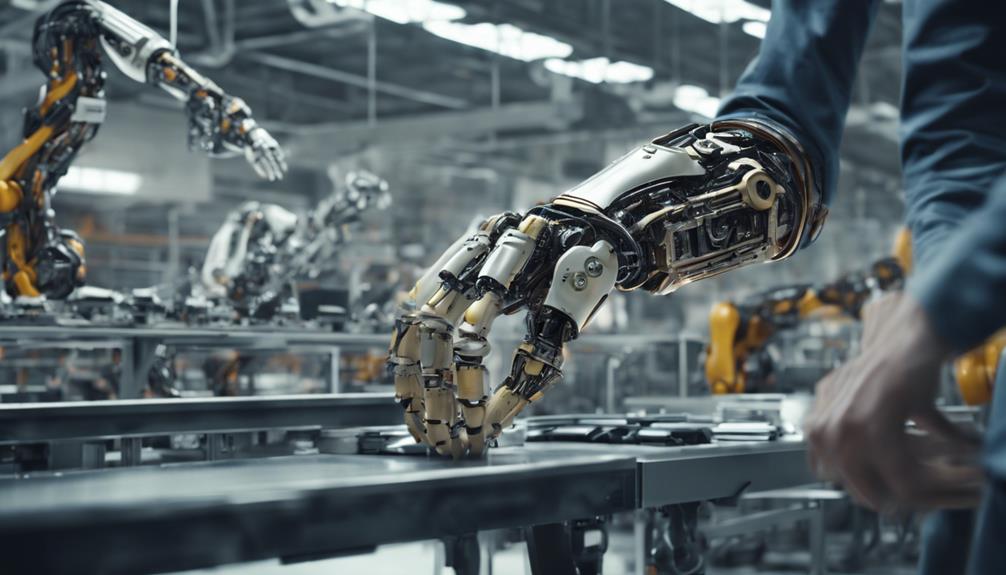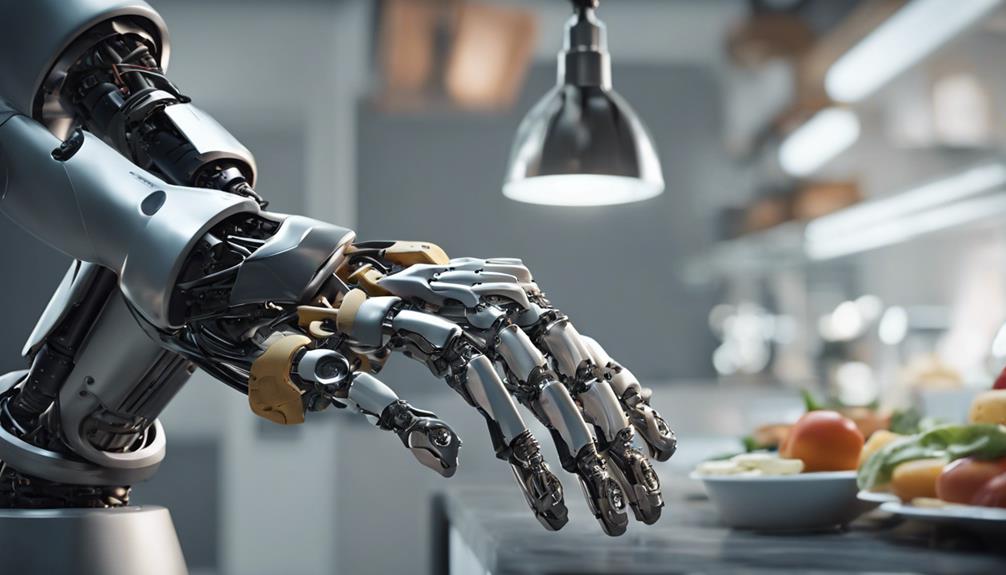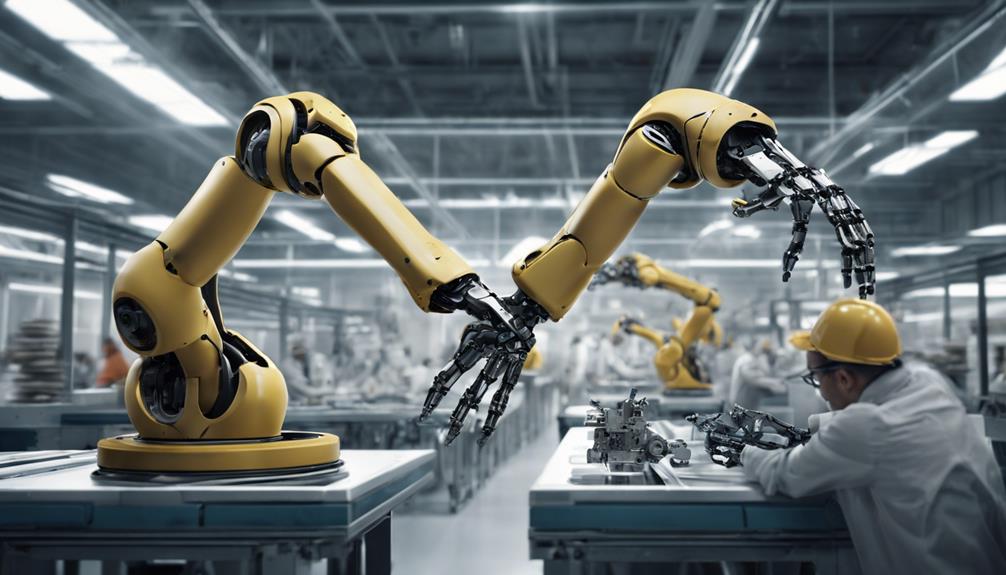Across the world, various sectors are swiftly integrating artificial intelligence, resulting in a noticeable shift in the job market. The move towards automating routine tasks and the emergence of AI-driven decision-making systems are greatly influencing the employment scenario.
The intricate balance between human expertise and machine capabilities has sparked debates on the future of work. Understanding how AI can potentially replace jobs is not just a matter of speculation but a critical analysis that demands attention.
In a world where technological advancements redefine career paths, the exploration of AI's impact on various professions becomes imperative for individuals and organizations alike.
Key Takeaways
- AI automation threatens various job roles like paralegals and market analysts.
- Upskilling and staying updated on AI tech are crucial for job security.
- Job market reshaping requires adaptability and soft skills development.
- Balancing AI integration with human creativity is vital for productive workforce transitions.
Impact of AI on Workforce
The profound impact of AI on the workforce is reshaping traditional job roles across various industries and sectors globally. AI technologies are increasingly being implemented to automate tasks previously performed by human workers, leading to the displacement of certain job roles. AI chatbots, for example, have the potential to replace positions such as paralegals and market analysts by streamlining tasks like document review and data analysis. This automation of routine functions allows human workers to allocate their time and skills to more complex and strategic responsibilities that require human insight and decision-making.
As AI continues to advance, it is projected that a significant number of jobs will be replaced by automation. Roles like telephone salespersons, solicitors, psychologists, teachers, and market traders are at risk of being overtaken by AI chatbots like ChatGPT and Google Bard. This shift towards automation is not limited to one industry but spans across various sectors, affecting workers in roles that involve repetitive tasks that can be streamlined through AI-driven technologies.
Job Types at Risk

With the advancement of AI technologies reshaping job roles across industries, various types of positions are now at risk of being replaced by automation. Customer service representatives face the threat of AI chatbots taking over their roles in handling inquiries and support tasks efficiently. Car and truck drivers encounter automation challenges due to the rise of autonomous vehicles, diminishing the need for human drivers. Computer programmers may see their jobs at risk as generative AI tools like ChatGPT can swiftly automate coding tasks. Research analysts also confront job displacement as AI can efficiently perform tasks such as market and financial analysis. Additionally, paralegals risk automation as AI can effectively handle administrative tasks and data processing in the legal field.
| Job Types | Automation Threats |
|---|---|
| Customer Service | AI chatbots |
| Autonomous Vehicles | Reduced need for human drivers |
| Computer Programmers | Generative AI tools |
Strategies for Adaptation
Embracing continuous learning and honing soft skills are essential strategies for individuals to navigate the evolving job market influenced by AI automation. In today's dynamic work environment, staying relevant and adaptable is key to withstanding the changes brought about by artificial intelligence.
To effectively adapt to the shifting job landscape, consider the following strategies:
- Specialize in specific areas: Deepening your expertise in niche fields can make you indispensable in a competitive job market.
- Stay updated with AI technology: Keeping abreast of the latest advancements in AI ensures you remain relevant and can leverage these tools effectively.
- Leverage AI tools: Embrace AI technologies to enhance your productivity and decision-making processes.
- Be agile in learning new skills: Cultivate a growth mindset and be willing to acquire new skills to meet the evolving job market demands.
- Develop soft skills: Communication, problem-solving, and adaptability are crucial in complementing technical skills and thriving in a job market reshaped by AI.
Reshaping the Job Market

The evolution of AI technologies is fundamentally reshaping the landscape of various industries by revolutionizing job roles and prompting a reevaluation of traditional employment paradigms.
AI technologies, such as chatbots and automation tools, are significantly impacting the job market by streamlining tasks like customer service and reducing the reliance on human workers in these areas. Industries like finance, legal, and administration are experiencing changes as AI takes on tasks such as transaction monitoring, document review, and data entry.
Moreover, automation in coding, graphic design, and other job roles is accelerating, leading to concerns regarding the balance between speed and quality. The integration of AI in professions like teaching and engineering is transforming responsibilities, enhancing productivity through automation, and fostering collaboration.
Consequently, various industries are witnessing shifts in job roles, necessitating changes in job requirements and skill sets to adapt to the changing landscape of the job market.
Navigating the Changing Landscape
As industries continue to adapt to the transformative effects of AI technologies, navigating the changing landscape of the job market requires a strategic approach that balances the integration of automation with the preservation of human expertise and creativity. In this dynamic environment, where AI development and automation are reshaping traditional job roles, understanding market trends and acquiring the necessary skills are crucial for success.
Below are key considerations for individuals and organizations:
- Identifying Job Loss Risks: Recognize which roles are at higher risk of being replaced by AI technologies to proactively prepare for potential disruptions.
- Embracing AI Development: Stay informed about AI advancements to capitalize on opportunities to create new AI-related jobs.
- Investing in Skill Development: Upskill and reskill workers to align with the evolving demands of the job market and leverage AI technologies effectively.
- Balancing Automation with Human Expertise: Strive to find a harmonious balance between AI automation and human creativity to optimize productivity and innovation.
- Supporting Workers: Provide resources and support for workers affected by job transitions to ensure a smooth adaptation to the changing job landscape.
Frequently Asked Questions
What Jobs AI Will Replace?
As technology advances, AI is poised to replace roles like customer service representatives, drivers, computer programmers, research analysts, and paralegals. Automation's efficiency in various sectors may lead to the displacement of human workers, reshaping the job market.
How Will AI Replace Human Work?
Artificial intelligence can replace human work by automating routine tasks, freeing up skilled workers for complex decision-making roles. This shift can enhance efficiency and productivity while emphasizing the importance of human creativity and critical thinking in the workforce.
Will AI Create Jobs or Replace Jobs?
AI's impact on jobs is multifaceted. While it may replace certain roles through automation, it also has the potential to create new opportunities that demand uniquely human skills like creativity, emotional intelligence, and critical thinking.
Why Some Jobs Cannot Be Replaced by Ai?
Some jobs resist AI's grasp due to the intricate dance of creativity, emotional depth, and human intuition they demand. These roles, like therapists and artists, remain enigmas to artificial intelligence, safeguarded by the essence of humanity they embody.
Conclusion
In conclusion, the transformative power of artificial intelligence on the workforce cannot be underestimated. As AI continues to reshape job roles and industries, it is imperative for individuals and organizations to adapt and embrace the changing landscape.
The question remains: how can we effectively navigate this evolving AI-driven world while ensuring ethical and thoughtful considerations in the process?









